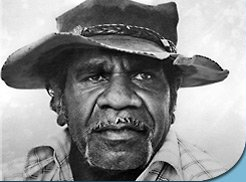Mr W. Rubuntja
Mr W. Rubuntja
Tribute To Mr W. Rubuntja
Tangentyere Council pays tribute to Mr W. Rubuntja Pengarte, who passed away in July 2005. Mr W. Rubuntja was one of the leading founders of Tangentyere Council and instrumental in gaining tenure and rights for town camp residents.
Mr W. Rubuntja led the struggle for land rights, reconciliation and the protection of sacred sites, and had a leading role in the establishment of other Aboriginal organisations in Central Australia, including the Central Land Council, Yipirinya School and the Central Australian Aboriginal Congress. Mr Rubuntja’s contribution to national public life was outstanding and he was made a member of the Order of Australia in 1995.
W Rubuntja was born around the mid 1920s at Burt Creek to the north of Alice Springs. His parents worked on stations in the vicinity of Alice Springs and in the town area itself, where he spent his early years. W Rubuntja married his wife Cynthia in the late 1950’s, and they had seven children.
W Rubuntja had little formal education, yet he confidently entered into the high level negotiations that characterized Aboriginal politics of the mid 1970s. In 1976 he led a major land rights demonstration through the streets of Alice Springs, followed by a deputation which campaigned for land rights across the country and culminated in a meeting in Canberra with the then Prime Minister, Malcolm Fraser.
In the early 1970s, Mr Rubuntja fought especially hard for the rights of his fellow town campers. He saw a need of an Aboriginal controlled council to provide basic services, such as providing services and shelter to Aboriginal people living on the fringes of the town. His lobbying helped gain the (now) special purpose leases and permanent housing for his fellow town campers; and the birth of Tangentyere Council.
W Rubuntja was the elected Chair of the Central Land Council from 1976 - 80, and from 1985 - 88. In 1988, the year which marked the bi-centenary of the planting of the British flag on Australian soil, W Rubuntja and the chair of the Northern Land Council, Galarrwuy Yunupingu, presented Prime Minister Bob Hawke with the Barunga statement, seeking recognition from the government of Aboriginal prior ownership of Australia and calling for a treaty.
W Rubuntja was a prolific painter. In the 1950s his father’s cousin, Albert Namatjira, inspired him to take up water colour painting. In the 1970s W Rubuntja began to use acrylics as well as water colour, and alternated between these media, while still rendering themes of country and Dreaming. His artwork is represented in many collections.
W Rubuntja’s well known and well loved repartee was laced with accounts of meetings with numerous ‘famous faces’. In his later years these tales became an amalgamation of persons, time and place - the holy father from Rome, Cheryl Kernot, the three little Queens, and the four Prime Ministers. He suggested once to a senior Aboriginal leader that he, ‘Put the mobile in his pocket and listen to his uncle’.
Throughout his life W Rubuntja stood in both Aboriginal and non-Aboriginal worlds. He lived his life in the world of the Central Australian town camps, and maintained a generosity of spirit that imagined a practical reconciliation between the original inhabitants of his country and its non-Indigenous residents. W Rubuntja had a great ability to integrate Indigenous and non-Indigenous concepts and believed that the Aboriginal and the non-Aboriginal communities have ‘to interpret each other’. He set an example of leadership that has been an inspiration to the next generation of Aboriginal leaders, and his legacy lives on in this and many other ways.
In spite of all the work he did in his life, he had little in the way of material possessions - he basically owned his hat, and the clothes he stood up in.
In 2002, Jenny Green and W Rubuntja wrote his story, in The Town Grew Up Dancing.
Mr. Rubuntja drew lifelong strength from his remarkable wife Cynthia and his children Mervyn, Marlene and Sally, his 15 grandchildren and 10 great grandchildren.
Tangentyere Council will always remember this great man with much love and respect as a true Australian statesman.
